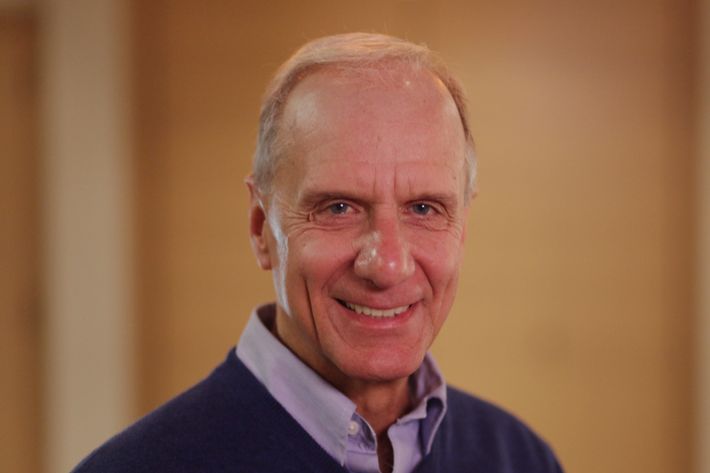
Of all the rituals of modern life that Silicon Valley technologists have burrowed their way into — eating, exercising, communicating, doing the laundry — one ritual that’s stayed largely undisrupted is religion. Despite its other advances, Silicon Valley remains one of the least religious parts of the country.
Vincent “Skip” Vaccarello is trying to change that. A 30-year veteran of the tech industry, Vaccarello was an executive at VisiCorp, an early PC-software-maker, and has been the CEO of Applied Weather Technology and Communications Solutions Inc., as well as a division manager for 3Com. He’s also a Christian, and has spent the last two decades trying to spread the gospel to Silicon Valley’s masses. He’s the chair of the Silicon Valley Prayer Breakfast, and the author of “Finding God in Silicon Valley,” a blog containing interviews with prominent Silicon Valley Christians that he is hoping to turn into a book.
I spoke to Vaccarello about his blog, his efforts to evangelize Silicon Valley, and what makes it hard to convert the tech-savvy. Here’s a condensed and edited version of our conversation.
Tech workers in Silicon Valley tend to be young, progressive, and very secular. Is this the hardest community in America to convert?
It is. George Barna [the evangelical pollster] did a survey and indicated that on any given Sunday, less than 5 percent of the people in Silicon Valley go to church. Silicon Valley people are smart skeptics. They also tend to live isolated lives. There are many transplants from other countries and states. Many of those people have not developed deep relationships. They desire to be successful. They want to change the world.
But at the same time, people are very skeptical of Christianity. Among the more successful, there’s a complacency. They think, Life seems great, I’ve got my stock options.
The guiding principle of Silicon Valley seems to be that the world can be perfected through technology. That hope seems to substitute for religious purpose in a lot of the tech people I know. Is that something you’ve seen?
I’d agree with that. I have a friend who did a book called Soul in Silicon, and his conclusion was that Silicon Valley is actually a very spiritual place, but that some of it is what you mentioned — people are, in a way, worshiping technology and success.
What I’ve found is that God is at work in Silicon Valley in the lives of many people. There really is a very committed group of people who have the desire to help others in their faith, who are committed to charity, who want to make the world a better place.
For a lot of people in Silicon Valley, though, the attitude seems to be that doing the work of technological advancement itself is a form of charity — that the world is better because they’re succeeding.
I’ve had many people say that. But people go through setbacks. It might be a divorce. It might be that stock options that were worth millions are now worth nothing. Or maybe they get fired from a job. When that happens, there are opportunities to talk about something that’s more important.
You’re saying there’s a counter-cyclical thing going on? When the tech bubble bursts and things are really bad for Silicon Valley companies, it will be good for Silicon Valley churches?
I do think there are absolutely those opportunities. I remember back in 1989, when the earthquake happened, Silicon Valley churches were packed with people. People were shaken up by it. People were saying, “There has to be something else.”

Skip, what made you decide to take up this cause?
I grew up in the Boston area – loving family, attended a Catholic church. But I was also a child of the late sixties and early seventies. And during college at Harvard, I kind of walked away from faith. Then, about twenty years later, a few people came into my life, and I began to think about faith. During that time, I was mostly building a career and a family. But the birth of our first child, I felt, was a miracle. And then our neighbors invited my wife to church. I was in Paris on business at the time, but she dragged me along when I got back. That was in the mid-eighties.
So I listened to what the pastor had to say, and over the next several months, I investigated the evidence for Christianity and really came to faith. And from that point forward, I really had a desire to live out my faith. So I got together a group of Silicon Valley executives, to say, “Well, how do we live out our faith day-to-day?”
And when did the blog come into play?
I went back to a Harvard reunion in 2008. There was a group of Christians who got together for a discussion, and right after that meeting, we got a book called Finding God at Harvard by Kelly Monroe. That planted a seed in my own mind to do something similar for Silicon Valley. One of [Monroe’s] purposes in writing that book was to show that you can be intelligent and still have faith. In Silicon Valley, a lot of people put material things and their career first, but I found it was really only God who could fill that space.
As a Christian in tech, what do you make of this issue, which seems to be a very contentious one, about start-ups and the homeless? Some tech workers have been publicly disparaging the homeless, saying that they need to get out of the “respectable” communities of Silicon Valley and go somewhere else.
I would hope that someone who is a follower of Christ would approach it differently. We’re to take care of the poor and the homeless.
Say you have a 22-year-old Google employee who is not religious, who is making a lot of money and living in Silicon Valley. How would you approach them and convince them to find Jesus?
There’s probably nothing I could do to convince such a person. It may sound odd, but it’s up to God. My hope is that some of the things I’m doing here will help. Service is one of the important ways to do it. Young people, whether they’re a Christian or not, have a desire to serve other people. That person might have his or her eyes opened if they were to go to a homeless shelter, to CityTeam or Freedom House, and in the process, they say, “Why are you doing this?” And we say, “Well, I’m a follower of Christ, and this is what I’m supposed to do.”
We also live in a little bit of a celebrity culture. I’m hoping that people might see someone like Pat Gelsinger, the CEO of VMWare, and a very committed follower of Christ, that someone might look at him and say, “Well, he’s different.” But if you’re talking about someone that’s happy, with lot of stock options and a cushy job at Google, it’s going to be difficult.
Who would be the ultimate convert? Mark Zuckerberg? Jack Dorsey?
Well, yeah, those are the current heroes. If any of those people were to say, “Okay, I’ve found the key to life,” that’d be great.
But some of it is going to come through service. The deficit that many Christians face is that people look at followers of Christ more for what they’re against than what they’re for.
That’s a big thing, I think. If you ask people in Silicon Valley why they’re not evangelicals, a lot would say, “Because I support gay marriage,” or “Because I support a woman’s right to choose.” How do you get around that?
There are people on the right and the left that are followers of Christ. But it’s unfortunate in some ways that Christianity has been identified exclusively as a right-wing group. When I have discussions with people, I don’t get into politics. To me, it’s not about politics. If someone’s gay, they’re gay, and that’s their lifestyle. I would talk more about the person of Christ.
Part of what’s interesting to me, about all of this, is that Silicon Valley is actually a place with a ton of faith. It’s just not faith in God. It’s faith in technology, in the future, in the power of innovation to shape society. Is there any way in which Silicon Valley might actually be well-suited to a religious revival?
People here live isolated lives. Christianity is about relationships and community. Yesterday, I was interviewing a guy, he’s a biotech guy, he’s brilliant. God has given him the mission in life of helping make the world a better place through biotechnology. He’s been doing stuff that is saving millions of lives with the product his company made.
Other people feel they’re on a mission to change the world in other ways. And maybe they make a billion dollars. But my hope is that when people go through a tough time, they’ll look at the site or read the book, find out more about what it is, and say, “Maybe these people aren’t as crazy as I thought they were.”





























